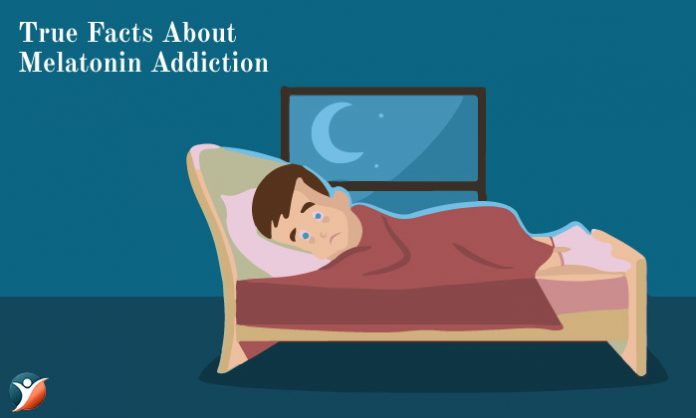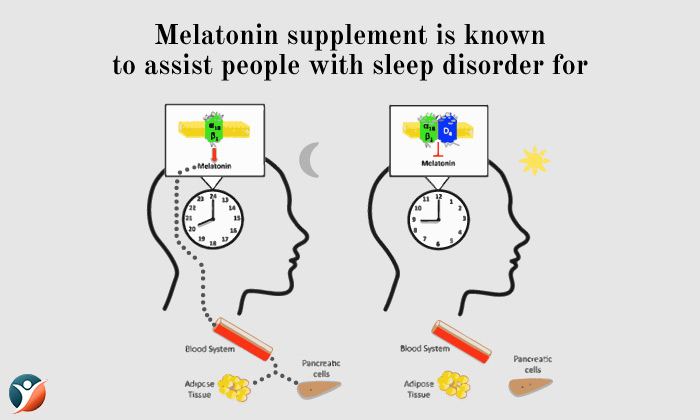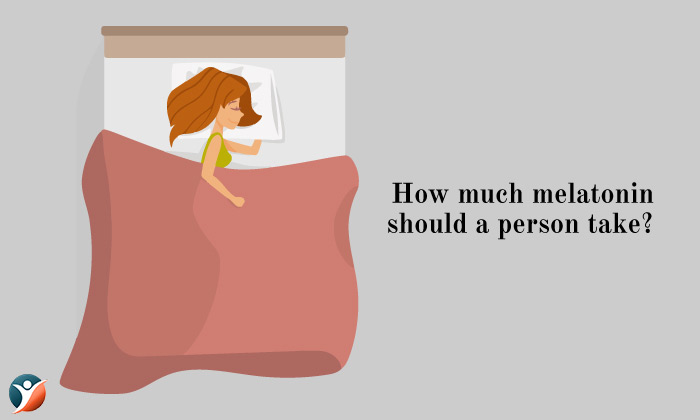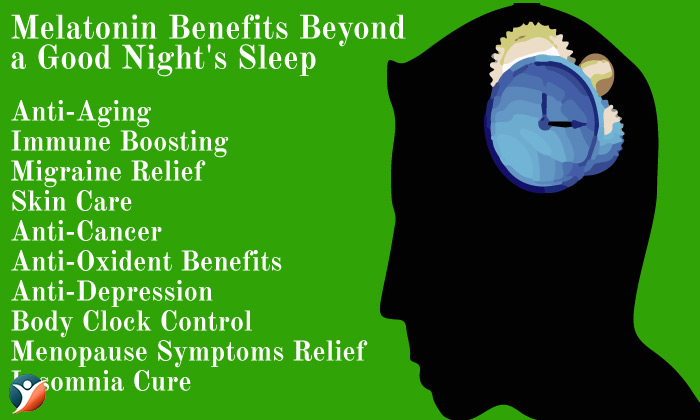
Melatonin is a hormone that naturally occurs in your body and is responsible for promoting sleep. Since it has a natural calm and sedating effect on the body, it is called ‘sleep hormone’.
The pineal gland in your brain is responsible for releasing melatonin at specific times in the day. The secretion is more at night, when you need to relax and sleep, and its production decreases when there is light outside.
Along with its sleep promoting action, melatonin is also known to have antioxidant and anti-inflammatory actions. It is also responsible for regulating immune system, blood pressure and body temperature. As your age increases, the amount of melatonin produced by the body decreases.
MIT neuro-scientist Richard Wurtman introduced melatonin to the world as an alternative solution to sleep problems. The main advantage of melatonin is the fact that it is non-addictive in nature and can substantially improve the sleep quality of people struggling with insomnia. However, the researcher warned people that they should not self-medicate with this supplement.
With time, melatonin has earned itself a spot in the medical cabinet of every insomniac. Easy accessibility, cost effectiveness and the natural character of the melatonin win it millions of hearts. As per the National Center for Complementary and Integrative Health, there are nearly 1.3 million American adults who had reported taking melatonin in 2015.
Melatonin supplement is known to help the following groups of people with sleep disorders:
- blind people
- shift workers
- those with jet lag
- children with developmental disorders, like autism spectrum disorder.
In the US, melatonin is available as an over-the-counter supplement, along with vitamins and supplements.

Table of Contents
- How much melatonin should a person take?
- The Insomnia Clause
- Benefits of Melatonin
- What are the side effects of taking melatonin?
- Can you become addicted to melatonin?
- The bottomline
How much melatonin should a person take?
Although melatonin is naturally made by the body, it is still necessary that you take proper precautions while taking its supplements. If you take less dose, it would not produce the desired results whereas more dose can cause side effects, including an interference in the sleep-wake cycle. Therefore, the trick is to take just optimum amount of the supplement that will produce the required effects without compromising on the quality of sleep and the rhythm of sleep-wake cycle.
As a matter of fact, some researchers believe the time at which the dose is take plays a much important role in determining the efficacy of the supplement rather than the amount of dose.
As per the guidelines, the starting dose of melatonin ranges from 0.2 to 5 mg. As you can see that this is a much wider range and therefore, user discretion is required. Start with the lowest dose and then go on titrating it until you reach the optimum dose that works the best for you. For people with general insomnia, a standard dose can range from anywhere between 0.3 to 10 mg. On the other hand, in older adults, the dose can range from 0.1 to 0.5 mg.
There are many commercial preparations of melatonin in the market that contain the active ingredient in much higher doses. As per the research, there is no need for these higher doses. People need to remember that this is a hormone and it would be best to take it in as low a dose as possible that shows its action.
Unless specifically directed by the physician, young children should not be given melatonin supplements. Also, pregnant women and breast-feeding mothers should refrain from taking this hormone until specifically prescribed by their doctor, howsoever safe the supplements might be claimed to be.
The exact dose of melatonin that should be taken varies as per a number of factors like your age, weight and your response to supplements and mediation. Before starting melatonin, make sure you discuss it with your doctor and make him aware of all the other medicines that yo are taking. This is necessary to make sure that melatonin has no adverse interaction with the other drugs that are being taken. There are some medicines that might also alter the person’s response to melatonin.

The Insomnia Clause
When melatonin is used occasionally and at the apt time, melatonin can work wonders in encouraging better quality sleep. However, with prolonged use, melatonin can also amplify insomnia. When there is too much melatonin in the system, the receptors get overwhelmed, thereby altering the way in which body reacts to the hormone, irrespective of its endogenous or exogenous nature.
Benefits of Melatonin
Apart from improving the quality of sleep, melatonin is known to have several other benefits as well. It helps in improving the conditions of people suffering from multiple sclerosis and shows potential in improving the condition of cancer patients. Its antioxidant properties slow down aging and makes skin glow. Melatonin is known to fight depression as well.

What are the side effects of taking melatonin?
Melatonin is basically taken as a sleep aid; therefore, sleepiness or drowsiness is a common side effect. If melatonin supplement is taken properly, side effects can be decreased to a minimum. However, as with other medicines and supplements, side effects can still occur with melatonin supplement, however infrequent. They can occur when melatonin supplement is taken in excess.
The US FDA identifies melatonin as a dietary substance and therefore, its packet does not have warning signs of overdose risks. This classification also allows companies to sell melatonin supplements at variable doses. More importantly, people should remember that melatonin is a hormone. If it is taken by children, it can adversely affect normal hormonal development, onset of puberty and regularity of menstrual cycle.
Excess melatonin can result in hypothermia, as melatonin release causes the body temperatures to decrease and stimulate overproduction of another hormone, prolactin. Excess of prolactin is known to result in hormonal problems along with liver and kidney issues in men.
Other side effects can include:
- nausea
- stomach cramps
- headache
- mild tremor
- dizziness
- temporary feelings of depression
- irritability
- low blood pressure
If you start taking melatonin and some side effects start occurring, it is important that you talk to your doctor. He might look into your situation and recommend another dose or any alternate supplement. Inform your doctor about any other medicines or supplements that you might be taking which might interact with melatonin. This information is necessary to rule out any case of adverse interaction.
While melatonin is thought to be used for short period of time, there are no long-term studies on the effect of melatonin on the body. The U.S. Food and Drug Administration (FDA) has laid down the regulations of dietary supplements, these regulations are different than that for OTC and prescription drugs and often much less strict in nature. If you are thinking of taking melatonin for a long period of time, this fact is important to keep in mind.
Can you become addicted to melatonin?
All natural things are not safe. Although there are reports of melatonin being addictive in nature, it is best to be aware about the potential effects of the substance.
Unlike sleep medications, melatonin does not cause symptoms of dependence or withdrawal in people. Neither does it cause any sleep hangover, implying that after taking this supplement you will not feel sleepy as the time passes by, nor is there any sign of tolerance. These facts indicate that melatonin does not cause any addiction. However, further research needs to be done in order to ascertain the long term effects of u sing melatonin supplements. [1]
If you or any of your family member has a history of addiction, discuss with your doctor before using melatonin and clear out all your concerns that might be bugging you. Taking melatonin supplements might not be the best choice for everyone. A doctor’s recommendation is extremely important.

The bottomline
Presently, there is no evidence in the literature that indicates the addictive nature of melatonin. This calls for more research on the use and side effects of melatonin. If you have any doubts, talk to your doctor.




